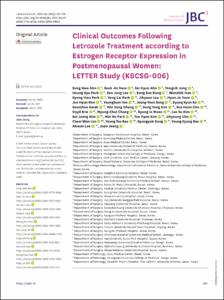Clinical Outcomes Following Letrozole Treatment according to Estrogen Receptor Expression in Postmenopausal Women: LETTER Study (KBCSG-006)
- Keimyung Author(s)
- Cho, Ji Hyoung
- Department
- Dept. of Surgery (외과학)
- Journal Title
- Journal of Breast Cancer
- Issued Date
- 2021
- Volume
- 24
- Issue
- 2
- Keyword
- Breast neoplasms; Letrozole; Postmenopause; Receptors; estrogen
- Abstract
- Purpose:
In this trial, we investigated the efficacy and safety of adjuvant letrozole for hormone receptor (HR)-positive breast cancer. Here, we report the clinical outcome in postmenopausal women with HR-positive breast cancer treated with adjuvant letrozole according to estrogen receptor (ER) expression levels.
Methods:
In this multi-institutional, open-label, observational study, postmenopausal patients with HR-positive breast cancer received adjuvant letrozole (2.5 mg/daily) for 5 years unless they experienced disease progression or unacceptable toxicity or withdrew their consent. The patients were stratified into the following 3 groups according to ER expression levels using a modified Allred score (AS): low, intermediate, and high (AS 3–4, 5–6, and 7–8, respectively). ER expression was centrally reviewed. The primary objective was the 5-year disease-free survival (DFS) rate.
Results:
Between April 25, 2010, and February 5, 2014, 440 patients were enrolled. With a median follow-up of 62.0 months, the 5-year DFS rate in all patients was 94.2% (95% confidence interval [CI], 91.8–96.6). The 5-year DFS and recurrence-free survival (RFS) rates did not differ according to ER expression; the 5-year DFS rates were 94.3% and 94.1%in the low-to-intermediate and high expression groups, respectively (p = 0.6), and the corresponding 5-year RFS rates were 95.7% and 95.4%, respectively (p = 0.7). Furthermore, 25 patients discontinued letrozole because of drug toxicity.
Conclusion:
Treatment with adjuvant letrozole showed very favorable treatment outcomes and good tolerability among Korean postmenopausal women with ER-positive breast cancer, independent of ER expression.
- Keimyung Author(s)(Kor)
- 조지형
- Publisher
- School of Medicine (의과대학)
- Citation
- Sung Gwe Ahn et al. (2021). Clinical Outcomes Following Letrozole Treatment according to Estrogen Receptor Expression in Postmenopausal Women: LETTER Study (KBCSG-006). Journal of Breast Cancer, 24(2), 164–174. doi: 10.4048/jbc.2021.24.e17
- Type
- Article
- ISSN
- 2092--9900
- Source
- https://ejbc.kr/DOIx.php?id=10.4048/jbc.2021.24.e17
- Appears in Collections:
- 1. School of Medicine (의과대학) > Dept. of Surgery (외과학)
- 파일 목록
-
-
Download
 oak-2021-0052.pdf
기타 데이터 / 3.53 MB / Adobe PDF
oak-2021-0052.pdf
기타 데이터 / 3.53 MB / Adobe PDF
-
Items in Repository are protected by copyright, with all rights reserved, unless otherwise indicated.